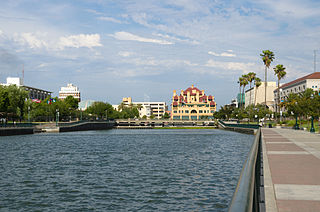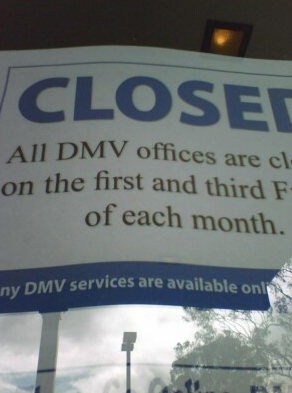Related Research Articles

Sacramento County is a county located in the U.S. state of California. As of the 2020 census, the population was 1,585,055. Its county seat is Sacramento, which has been the state capital of California since 1854.

San Joaquin County, officially the County of San Joaquin, is a county located in the U.S. state of California. As of the 2020 census, the population was 779,233. The county seat is Stockton.

Fiona Ma is an American accountant and politician. She has been serving as the California state treasurer since January 7, 2019. She previously served as a member of the California Board of Equalization (2015–2019), the California State Assembly (2006–2012), and the San Francisco Board of Supervisors (2002–2006).

Tax increment financing (TIF) is a public financing method that is used as a subsidy for redevelopment, infrastructure, and other community-improvement projects in many countries, including the United States. The original intent of a TIF program is to stimulate private investment in a blighted area that has been designated to be in need of economic revitalization. Similar or related value capture strategies are used around the world.

Municipalization is the transfer of private entities, assets, service providers, or corporations to public ownership by a municipality, including a city, county, or public utility district ownership. The transfer may be from private ownership or from other levels of government. It is the opposite of privatization and is different from nationalization. The term municipalization largely refers to the transfer of ownership of utilities from Investor Owned Utilities (IOUs) to public ownership, and operation, by local government whether that be at the city, county or state level. While this is most often applied to electricity it can also refer to solar energy, water, sewer, trash, natural gas or other services.
The Metropolitan Transportation Commission (MTC) is the government agency responsible for regional transportation planning and financing in the San Francisco Bay Area. It was created in 1970 by the State of California, with support from the Bay Area Council, to coordinate transportation services in the Bay Area's nine counties: Alameda, Contra Costa, Marin, Napa, San Francisco, San Mateo, Santa Clara, Solano, and Sonoma. The MTC is fourth most populous metropolitan planning organization in the United States.

The California special election of 2005 was held on November 8, 2005 after being called by Governor Arnold Schwarzenegger on June 13, 2005.
In November 2004, voters in the U.S. state of California passed Proposition 63, the Mental Health Services Act (MHSA), which has been designed to expand and transform California's county mental health service systems. The MHSA is funded by imposing an additional one percent tax on individual, but not corporate, taxable income in excess of one million dollars. In becoming law in January 2005, the MHSA represents the latest in a Californian legislative movement, begun in the 1990s, to provide better coordinated and more comprehensive care to those with serious mental illness, particularly in underserved populations. Its claim of successes thus far, such as with the development of innovative and integrated Full Service Partnerships (FSPs), are not without detractors who highlight many problems but especially a lack of oversight, large amount of unspent funds, poor transparency, lack of engagement in some communities, and a lack of adherence to required reporting as challenges MHSA implementation must overcome to fulfill the law's widely touted potential.

William Westwood Lockyer is a retired American politician from California, who held elective office from 1973 to 2015, as State Treasurer of California, California Attorney General, and President Pro Tempore of the California State Senate.

The California Department of Corrections and Rehabilitation (CDCR) is the penal law enforcement agency of the government of California responsible for the operation of the California state prison and parole systems. Its headquarters are in Sacramento.

Roger Niello is an American politician who is currently in the California State Senate representing the 6th district, which includes portions of Sacramento and Placer counties. He is a Republican who had also served in the California State Assembly from 2004 to 2010.

Joel Anderson is an American politician serving as a member of the San Diego County Board of Supervisors. A Republican, he is a former California state senator, assemblyperson, and board member of a municipal water district. During his time in the Legislature, Anderson served on the board of the American Legislative Exchange Council (ALEC) as California state chair.

Community Choice Aggregation (CCA), also known as Community Choice Energy, municipal aggregation, governmental aggregation, electricity aggregation, and community aggregation, is an alternative to the investor-owned utility energy supply system in which local entities in the United States aggregate the buying power of individual customers within a defined jurisdiction in order to secure alternative energy supply contracts. The CCA chooses the power generation source on behalf of the consumers.

Carmen Chu is an American politician serving as City Administrator of the City and County of San Francisco. She previously served as the city's assessor-recorder, where she was the only Asian-American assessor elected to serve among the 58 counties in the State of California. Prior to being elected assessor-recorder, Chu served as a member of the San Francisco board of supervisors, where she served two terms as the chair of the board's budget and finance committee, and was a board director of the Golden Gate Bridge, Highway and Transportation District. Before joining the board of supervisors, Chu served as deputy budget director in the mayor's office of public policy and finance. In July 2022, she was appointed to the Regents of the University of California by Governor Gavin Newsom.

The U.S. state of California had a budget crisis in which it faced a shortfall of at least $11.2 billion, projected to top $40 billion over the 2009–2010 fiscal years.

The Government of Los Angeles County is defined and authorized under the California Constitution, California law, and the Charter of the County of Los Angeles. Much of the Government of California is in practice the responsibility of county governments, such as the Government of Los Angeles County. The County government provides countywide services such as elections and voter registration, law enforcement, jails, vital records, property records, tax collection, public health, health care, and social services. In addition the County serves as the local government for all unincorporated areas.

The Government of San Diego County is defined and authorized under the California Constitution, California law, and the Charter of the County of San Diego. Much of the Government of California is in practice the responsibility of county governments such as the Government of San Diego County. The County government provides countywide services such as elections and voter registration, law enforcement, jails, vital records, property records, tax collection, public health, and social services. In addition the County serves as the local government for all unincorporated areas.
The Government of Sacramento County is defined and authorized under the California Constitution, California law, and the Charter of the County of Sacramento. Much of the government of California is in practice the responsibility of county governments, such as the Government of Sacramento County. The County government provides countywide services such as elections and voter registration, law enforcement, jails, vital records, property records, tax collection, public health, and social services. In addition the County serves as the local government for all unincorporated areas.
The Sacramento County Public Law Library (SCPLL) is a “public” law library in the capital city of the State of California. In 1891 the state of California enacted statutes mandating an independent law library in every county. Since its inception SCPLL has provided free public access to legal information.
References
- ↑ Schultz, E.J. (January 2, 2010). "Valley lobbying: Wasteful or wise?". Fresno Bee. Retrieved January 6, 2010.[ permanent dead link ]
- 1 2 "California State Association of Counties website". Archived from the original on January 7, 2010. Retrieved January 6, 2010.
- 1 2 "CSAC - More Than a Century of Service to Counties". CSAC Website. Archived from the original on February 1, 2010. Retrieved January 10, 2010.
- ↑ "Counties Shoulder $4.3 billion in Cuts, IOUs $776 million in IOUs Coming in July Alone" (PDF). CSAC press release. July 1, 2000. Archived from the original (PDF) on February 1, 2010. Retrieved January 8, 2010.
- ↑ Coté, John (July 22, 2009). "Cities, counties ready to fight state over cuts". San Francisco Chronicle. Retrieved January 8, 2010.